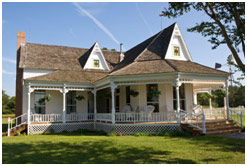Once considered a mansion on the frontier, it was home to Chickasaw Governor Douglas Henry Johnston and his family from 1898 to 1971.
The Chickasaw White House, located on the north edge of Emet, Oklahoma, was necessarily the scene of many important social and political events. Oklahoma Governor William E. "Alfalfa Bill" Murray was married there to Alice Hearell, a niece of Governor Johnston. Their son, Johnston Murray, was also born in the house, and was destined to become Oklahoma's 14th governor in 1951. Other marriages took place in the house, including that of Julia Chisholm, granddaughter of the famed Jesse Chisholm and adopted niece of Governor Johnston. Prominent politicians and members of the Dawes Commission also met at the house. The Governor scored several notable achievements on behalf of the Chickasaw Nation and its people, by appealing upon occasion directly to President Theodore Roosevelt, who was instrumental in keeping white adventurers off tribal rolls, in maintaining tribal control over Indian schools, and in saving tribal government by insisting Washington live up to its treaty obligations in regard to taxes.
Oklahoma Governor William E. "Alfalfa Bill" Murray was married there to Alice Hearell, a niece of Governor Johnston. Their son, Johnston Murray, was also born in the house, and was destined to become Oklahoma's 14th governor in 1951. Other marriages took place in the house, including that of Julia Chisholm, granddaughter of the famed Jesse Chisholm and adopted niece of Governor Johnston. Prominent politicians and members of the Dawes Commission also met at the house. The Governor scored several notable achievements on behalf of the Chickasaw Nation and its people, by appealing upon occasion directly to President Theodore Roosevelt, who was instrumental in keeping white adventurers off tribal rolls, in maintaining tribal control over Indian schools, and in saving tribal government by insisting Washington live up to its treaty obligations in regard to taxes.
Mrs. Johnston (Bettie) planted large cannas beds, jonquils, roses, day lilies, crepe myrtle trees, and trumpet vines. Known for her medicinal skills, she found an abundance of herbs and plants on the property for use in home remedies and food preparations. Although she called the home "Breezy Meadow" the name never caught on and was discarded in favor of the "White House."
The astonishing thirty-six year tenure of Chickasaw Governor Douglas H. Johnston represents an important period in Chickasaw national life. Much of the history echoed within the rooms of the Chickasaw White House between 1898, when the house was built, and 1939, when the Governor died of heart failure in Oklahoma City. While of general public interest, the White House holds particular patrimonial significance for the Chickasaw People. The unique combination of tribal institutions and Southern social and political influences is a story within which all may find greater understanding of Indian Territory and the Chickasaw experience in the early twentieth century.
Museum Hours:
Tuesday through Saturday, 9 a.m.-4 p.m.
Closed for federal holidays
Group tours are available by reservation and are limited to 14 people per tour. To reserve a group tour, please contact the Chickasaw White House.